


We are revolutionizing room acoustics and thermal insulation with a remarkable natural material: mycelium. With this natural solution, we offer superior acoustics and efficient insulation that has many advantages over conventional materials.
Our goal is to replace synthetic materials such as plastic with biodegradable composite materials. With circular solutions, we are combating the global resource crisis and shaping a more environmentally friendly future. At the same time, we are creating healthier living and working environments.
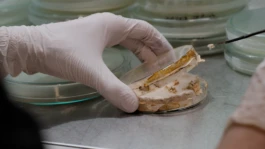
Our panels are not built or glued together - we let them grow! In doing so, we make use of a fascinating property of fungi. Fungal mycelium, the network of fine fungal threads, grows underground or in other substrates and serves as a food source for the fungus. In our panels, the mycelium acts as a natural "glue" that connects the various natural components - without any artificial or environmentally harmful substances.
With Mycolutions, we have established a standardized production process for our modular absorber plates. In addition, the use of 3D molded inlays in the growth forms enables a wide range of surface structures without changing the manufacturing process.
The result are 100% natural and toxin-free sound absorbers and insulating materials that have excellent properties by nature.
100% biocircular
water-saving
co2 saving
toxin-free
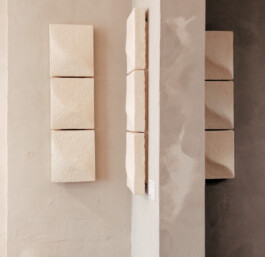

SOUND ABSORBER MADE FROM MYCELIUM
Our acoustic absorbers effectively dampen sound over a wide frequency range. The open-pored surface of the natural mycelium material reduces noise by converting sound energy, making it ideal for offices, coworking spaces, studios or other rooms where reverberation is a challenge. In addition, our manufacturing process allows for a variety of surface textures, making our sound absorbers visually striking.
We are already working intensively on further sustainable room solutions. Because we are convinced that excellent acoustics, a healthy indoor climate and sustainability go hand in hand.
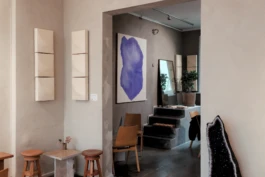
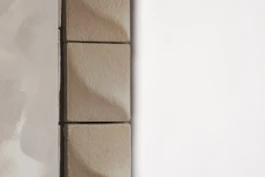
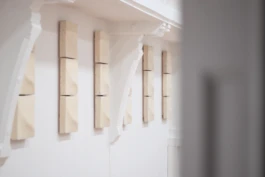
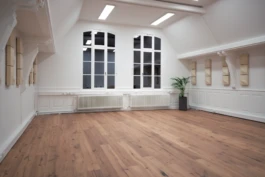
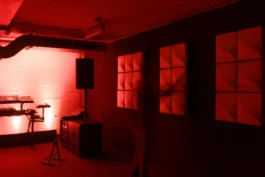
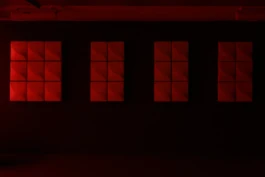
Trader - Gallery and Café
Trader - Gallery and Café
Utopia Lüneburg - Start-up Center and Co Working
Utopia Lüneburg - Start-up Center and Co Working
Abstract Now - sound installation
Abstract Now - sound installation
We are a team of five environmental engineers and product designers from Hamburg, united by our enthusiasm for natural materials and technical solutions. Our passion for music and our deep understanding of nature inspire us every day. We are convinced that there should be sustainable alternatives to conventional materials - free of harmful substances, affordable and resource-saving.
We are certain that there is still a great deal of growth potential here - in the truest sense of the word.
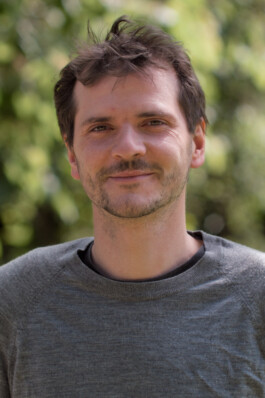

Product Design
Lukas Hopp

Co-Founder & CEO
Helge Schritt

Material Design
Annina Spies

Co-Founder & CTO
Thies Lingner
Would you like to find out more about our solutions or do you have any questions about our products? Simply fill out the form below and we will get back to you as soon as possible.
MycoLutions is an innovative company that develops sustainable acoustic and insulation materials from mycelium. These materials are biogenic, toxin-free and completely biodegradable. Our vision is to replace environmentally harmful materials such as polystyrene and synthetic foams with mycelium materials in the future in order to make a positive contribution to reducing waste and pollution and to offer sustainable solutions for building and interior design.
What advantages do mycelium materials offer compared to conventional materials?
Mycelium materials are characterized by their light weight and easy handling and also offer exceptional aesthetic and acoustic properties. They are environmentally friendly as they are made from organic waste and can either be recycled or composted at the end of their life cycle.
How do mycelium materials contribute to sustainability?
By using organic residues from agriculture and the possibility of composting or recycling at the end of their life cycle, our materials help to reduce waste and protect natural resources.
How can mycelium materials be composted?
Our mycelium-based materials can be composted as normal.
What measures does MycoLutions take to promote sustainability?
At MycoLutions, we continuously use a Life Cycle Assessment (LCA) to evaluate the environmental footprint of our products over their entire life cycle. This process enables us to develop new solutions and technologies that optimize our production processes and minimize our environmental footprint.
How are mycelium materials produced?
Our materials are created by the growth of fungal mycelium on organic residues from agriculture. The mycelium acts as a natural adhesive that binds the components into a stable matrix without the use of artificial or environmentally harmful substances.
What properties do the mycelium materials have?
Our panels made of mycelium material are characterized by excellent sound absorption and efficient thermal insulation. They are versatile and contain no VOCs (volatile organic compounds), which are found in conventional building materials, including polystyrene, and can affect indoor air quality.
Does MycoLutions offer customized solutions?
Contact us using the form on our website or by e-mail. Our team will be happy to help you select the right materials and plan your project.
How can I order mycelium materials or start a project?
Yes, under certain conditions we also offer customized solutions that are tailored to the specific needs and requirements of your project. Contact us directly to find out more about the possibilities.
How much do the mycelium modules cost?
The prices for mycelium modules vary depending on the size and type of order. We are therefore unable to provide general price information. Contact us and we will be happy to provide you with a customized quote for your project.
For which areas of application are mycelium materials suitable?
Our materials are ideal for offices, coworking spaces, studios and other rooms where acoustics and a healthy indoor climate are important. They can be used in a variety of ways in architecture, interior design and design projects.
Are there any examples of current projects?
Yes, we already have realised pilot projects in co-working spaces and an art gallery that is also used as a café. These projects demonstrate the versatility and aesthetic benefits of our materials.
Can the fungus continue to grow in the mycelium materials?
No, after the drying process, further growth of the fungus is impossible. During production, the material is heated and dried, which permanently stops the growth of the fungus. This ensures that the fungus does not continue to grow.
Can the mycelium materials emit fungal spores?
No, mycelium materials do not release fungal spores. No fruiting bodies are formed in the production process or in the finished product, which rules out the release of spores.
How resistant are mycelium materials to moisture and mold?
Our mycelium panels are generally resistant and hydrophobic. Nevertheless, we do not recommend using them in humid rooms such as bathrooms or outdoors, as this can affect their durability.
How long do mycelium materials last?
Under constant room conditions, our mycelium materials have a planned lifespan of around 10 years.
Supported by:
Awards and certificates:
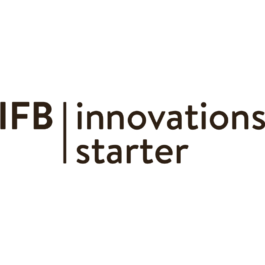




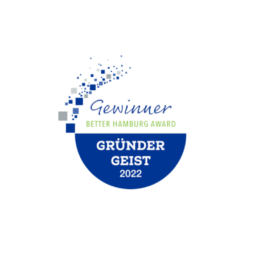
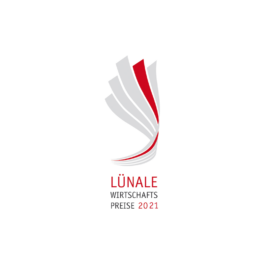


This project is supported by EIT Community NEB, an initiative of the European Institute of Innovation and Technology (EIT), a body of the European Union.

-
We are revolutionizing room acoustics and thermal insulation with a remarkable natural material: mycelium. With this natural solution, we offer superior acoustics and efficient insulation that has many advantages over conventional materials.
Our goal is to replace synthetic materials such as plastic with biodegradable composite materials. With circular solutions, we are combating the global resource crisis and shaping a more environmentally friendly future. At the same time, we are creating healthier living and working environments.
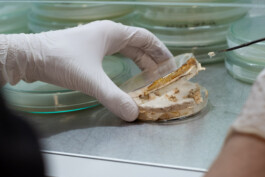
Our panels are not built or glued together - we let them grow! In doing so, we make use of a fascinating property of fungi. Fungal mycelium, the network of fine fungal threads, grows underground or in other substrates and serves as a food source for the fungus. In our panels, the mycelium acts as a natural "glue" that connects the various natural components - without any artificial or environmentally harmful substances.
100% biocircular
water-saving
co2 saving
toxin-free
SOUND ABSORBER MADE FROM MYCELIUM
Our acoustic absorbers effectively dampen sound over a wide frequency range. The open-pored surface of the natural mycelium material reduces noise by converting sound energy, making it ideal for offices, coworking spaces, studios or other rooms where reverberation is a challenge. In addition, our manufacturing process allows for a variety of surface textures, making our sound absorbers visually striking.
We are already working intensively on further sustainable room solutions. Because we are convinced that excellent acoustics, a healthy indoor climate and sustainability go hand in hand.






Trader - Gallery and Café
Trader - Gallery and Café
Utopia Lüneburg - Start-up Center and Co Working
Utopia Lüneburg - Start-up Center and Co Working
Abstract Now - sound installation
Abstract Now - sound installation
We are a team of five environmental engineers and product designers from Hamburg, united by our enthusiasm for natural materials and technical solutions. Our passion for music and our deep understanding of nature inspire us every day. We are convinced that there should be sustainable alternatives to conventional materials - free of harmful substances, affordable and resource-saving.
We are certain that there is still a great deal of growth potential here - in the truest sense of the word.


Product Design
Lukas Hopp

Co-Founder & CEO
Helge Schritt

Material Design
Annina Spies

Co-Founder & CTO
Thies Lingner
Would you like to find out more about our solutions or do you have any questions about our products? Simply fill out the form below and we will get back to you as soon as possible.
MycoLutions is an innovative company that develops sustainable acoustic and insulation materials from mycelium. These materials are biogenic, toxin-free and completely biodegradable. Our vision is to replace environmentally harmful materials such as polystyrene and synthetic foams with mycelium materials in the future in order to make a positive contribution to reducing waste and pollution and to offer sustainable solutions for building and interior design.
What advantages do mycelium materials offer compared to conventional materials?
Mycelium materials are characterized by their light weight and easy handling and also offer exceptional aesthetic and acoustic properties. They are environmentally friendly as they are made from organic waste and can either be recycled or composted at the end of their life cycle.
How are mycelium materials produced?
Our materials are created by the growth of fungal mycelium on organic residues from agriculture. The mycelium acts as a natural adhesive that binds the components into a stable matrix without the use of artificial or environmentally harmful substances.
What properties do the mycelium materials have?
Our panels made of mycelium material are characterized by excellent sound absorption and efficient thermal insulation. They are versatile and contain no VOCs (volatile organic compounds), which are found in conventional building materials, including polystyrene, and can affect indoor air quality.
For which areas of application are mycelium materials suitable?
Our materials are ideal for offices, coworking spaces, studios and other rooms where acoustics and a healthy indoor climate are important. They can be used in a variety of ways in architecture, interior design and design projects.
Are there any examples of current projects?
Yes, we already have realised pilot projects in co-working spaces and an art gallery that is also used as a café. These projects demonstrate the versatility and aesthetic benefits of our materials.
How do mycelium materials contribute to sustainability?
By using organic residues from agriculture and the possibility of composting or recycling at the end of their life cycle, our materials help to reduce waste and protect natural resources.
How can mycelium materials be composted?
Our mycelium-based materials can be composted as normal.
What measures does MycoLutions take to promote sustainability?
At MycoLutions, we continuously use a Life Cycle Assessment (LCA) to evaluate the environmental footprint of our products over their entire life cycle. This process enables us to develop new solutions and technologies that optimize our production processes and minimize our environmental footprint.
How can I order mycelium materials or start a project?
Contact us using the form on our website or by e-mail. Our team will be happy to help you select the right materials and plan your project.
Does MycoLutions offer customized solutions?
Yes, under certain conditions we also offer customized solutions that are tailored to the specific needs and requirements of your project. Contact us directly to find out more about the possibilities.
How much do the mycelium modules cost?
The prices for mycelium modules vary depending on the size and type of order. We are therefore unable to provide general price information. Contact us and we will be happy to provide you with a customized quote for your project.
Can the fungus continue to grow in the mycelium materials?
No, after the drying process, further growth of the fungus is impossible. During production, the material is heated and dried, which permanently stops the growth of the fungus. This ensures that the fungus does not continue to grow.
Can the mycelium materials emit fungal spores?
No, mycelium materials do not release fungal spores. No fruiting bodies are formed in the production process or in the finished product, which rules out the release of spores.
How resistant are mycelium materials to moisture and mold?
Our mycelium panels are generally resistant and hydrophobic. Nevertheless, we do not recommend using them in humid rooms such as bathrooms or outdoors, as this can affect their durability.
How long do mycelium materials last?
Under constant room conditions, our mycelium materials have a planned lifespan of around 10 years.
Supported by:





This project is supported by EIT Community NEB, an initiative of the European Institute of Innovation and Technology (EIT), a body of the European Union.
Awards and certificates:



